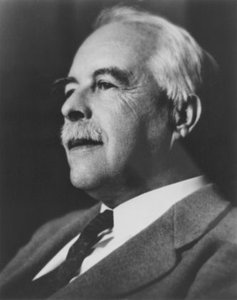A Quote by Gilbert N. Lewis
I take it that a monograph of this sort belongs to the ephemera literature of science. The studied care which is warranted in the treatment of the more slowly moving branches of science would be out of place here. Rather with the pen of a journalist we must attempt to record a momentary phase of current thought, which may at any instant change with kaleidoscopic abruptness.
Related Quotes
So far I have been speaking of theoretical science, which is an attempt to understand the world. Practical science, which is an attempt to change the world, has been important from the first, and has continually increased in importance, until it has almost ousted theoretical science from men's thoughts.
At present, when the prevailing forms of society have become hindrances to the free expression of human powers, it is precisely the abstract branches of science, mathematics and theoretical physics, which ... offer a less distorted form of knowledge than other branches of science which are interwoven with the pattern of daily life, and the practicality of which seemingly testifies to their realistic character.
If complex organisms demand an explanation, so does a complex designer. And it's no solution to raise the theologian's plea that God (or the Intelligent Designer) is simply immune to the normal demands of scientific explanation. To do so would be to shoot yourself in the foot. You cannot have it both ways. Either ID belongs in the science classroom, in which case it must submit to the discipline required of a scientific hypothesis. Or it does not, in which case, get it out of the science classroom and send it back to church, where it belongs.
Sciences usually advances by a succession of small steps, through a fog in which even the most keen-sighted explorer can seldom see more than a few paces ahead. Occasionally the fog lifts, an eminence is gained, and a wider stretch of territory can be surveyed-sometimes with startling results. A whole science may then seem to undergo a kaleidoscopic rearrangement, fragments of knowledge sometimes being found to fit together in a hitherto unsuspected manner. Sometimes the shock of readjustment may spread to other sciences; sometimes it may divert the whole current of human thought.
Change begets change. Nothing propagates so fast. If a man habituated to a narrow circle of cares and pleasures, out of which he seldom travels, step beyond it, though for never so brief a space, his departure from the monotonous scene on which he has been an actor of importance would seem to be the signal for instant confusion. The mine which Time has slowly dug beneath familiar objects is sprung in an instant; and what was rock before, becomes but sand and dust.
Science is one thing, wisdom is another. Science is an edged tool, with which men play like children, and cut their own fingers. If you look at the results which science has brought in its train, you will find them to consist almost wholly in elements of mischief. See how much belongs to the word "Explosion" alone, of which the ancients knew nothing.
The laws of thermodynamics may be regarded as particular cases of more general laws, applicable to all such states of matter as constitute Energy , or the capacity to perform work, which more general laws form the basis of the science of energetics, a science comprehending, as special branches, the theories of motion, heat, light , electricity , and all other physical phenomena.
The whole point of science is that most of it is uncertain. That's why science is exciting--because we don't know. Science is all about things we don't understand. The public, of course, imagines science is just a set of facts. But it's not. Science is a process of exploring, which is always partial. We explore, and we find out things that we understand. We find out things we thought we understood were wrong. That's how it makes progress.
The laws of thought are natural laws with which we have no power to interfere, and which are of course not to be in any way confused with the artificial laws of a country, which are invented by men and can be altered by them. Every science is occupied in detecting and describing the natural laws which are inflexibly observed by the objects treated in the Science.
The impossibility of separating the nomenclature of a science from the science itself, is owing to this, that every branch of physical science must consist of three things; the series of facts which are the objects of the science, the ideas which represent these facts, and the words by which these ideas are expressed. Like three impressions of the same seal, the word ought to produce the idea, and the idea to be a picture of the fact.
As ideas are preserved and communicated by means of words, it necessarily follows that we cannot improve the language of any science, without at the same time improving the science itself; neither can we, on the other hand, improve a science without improving the language or nomenclature which belongs to it.




































